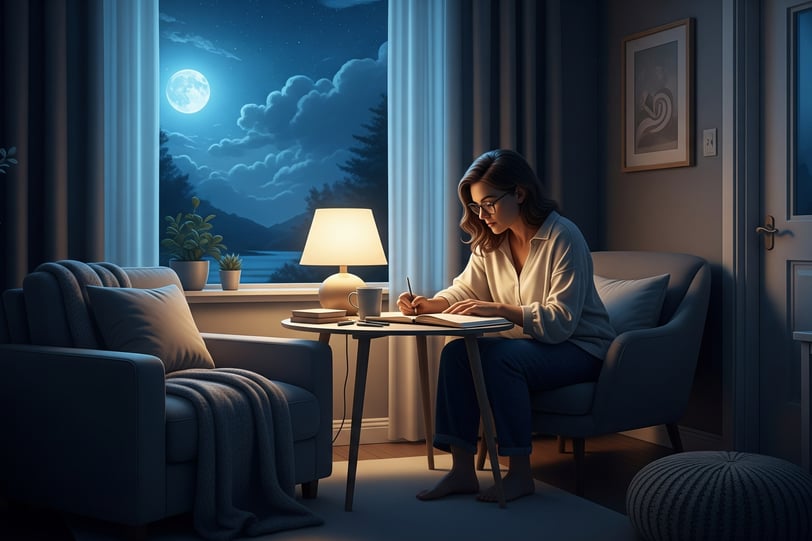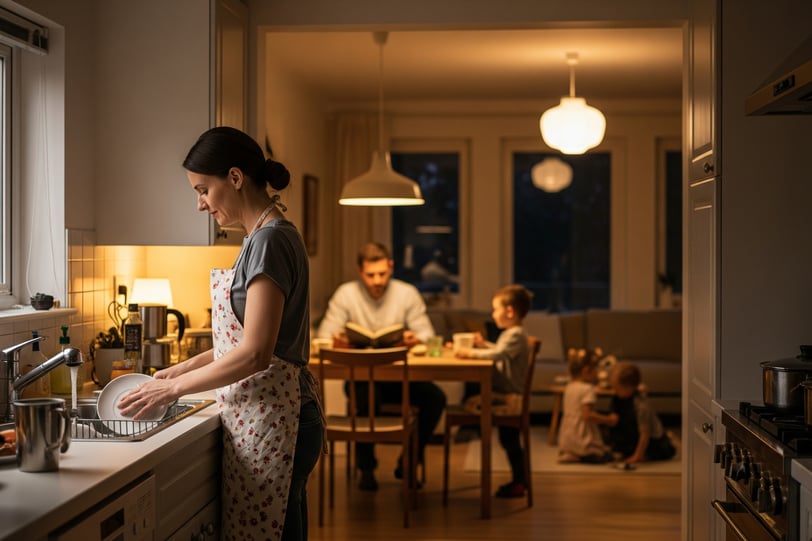
Unplug & Unwind: 15 Soothing Nighttime Routine for Moms (No Wine Required!)
TABLE OF CONTENTS
Why Your Current Nighttime Routine Might Not Be Working
The Science Behind Why We Need Better Bedtime Self-Care
Creating Your Personal Nightly Self Care Checklist
Physical Unwinding Activities
Mental and Emotional Reset Activities
Sensory Comfort Activities
Less Common But Super Effective Nighttime Routine Ideas
Creative Expression Activities
Connection and Communication
Mindful Household Activities
Creating Your Personal Bedtime Self-Care Sequence
Week 1: Pick Your Foundation
Week 2: Add Timing Structure
Week 3: Fine-Tune and Adjust
Week 4: Lock It In
Making It Work With Real Mom Life
The 10-Minute Version
The 15-Minute Version
The 20-Minute Version (for those lucky nights!)
Troubleshooting Common Challenges
The Long-Term Benefits You Can Expect
Your Next Steps
Hey there, can we talk about something real for a second? You know that moment when the kids are finally asleep, the dishes are done (or maybe they're not, and that's totally okay), and you're standing in your kitchen thinking "NOW what?"
Like, you KNOW you need to unwind, but you're so tired of reaching for that glass of wine every single night. Don't get me wrong - there's absolutely nothing wrong with enjoying a glass of wine, but when it becomes your only nighttime routine for self-care, you might be missing out on some seriously amazing alternatives that could actually help you sleep better and feel more energized the next day.
According to the American Psychological Association, 75% of adults report experiencing moderate to high levels of stress, and for moms specifically, that number jumps even higher. So basically, we're all walking around like stressed-out zombies, and our bedtime self-care routines (or lack thereof) aren't helping us recover.
But here's the thing - and this is where it gets exciting - there are SO many incredible ways to create a nightly self care checklist that actually helps your body and mind transition from "mom mode" to "rest mode" without relying on alcohol. And honestly? Some of these ideas might surprise you because they're not your typical "take a bubble bath" suggestions.


Why Your Current Nighttime Routine Might Not Be Working
Before we dive into the good stuff, let's talk about why so many of us struggle with unwinding at night. According to sleep researcher Dr. Matthew Walker, author of "Why We Sleep," our modern lifestyle habits are literally working against our natural sleep cycles.
Here's what's probably happening in your current routine:
You're scrolling through your phone right before bed (I admit to doing this)
You're mentally replaying the day's stresses
You're already thinking about tomorrow's to-do list
You're using stimulants (like that late-afternoon coffee) to get through the day
Dr. Walker's research shows that blue light from screens can suppress melatonin production for up to 3 hours, which explains why you're lying awake at 11 PM even though you're exhausted. The National Sleep Foundation reports that 95% of people use some type of electronics within an hour of bedtime, so you're definitely not alone in this struggle.
The Science Behind Why We Need Better Bedtime Self-Care
Okay, so here's where it gets really interesting. Studies have found that people who had consistent evening routines reported better sleep quality and less stress compared to those who didn't. That's HUGE, right?
Harvard Medical School consistently emphasizes the importance of stress management and healthy sleep habits for reducing cortisol and improving overall well-being. They recommend winding down before bed with relaxing activities. So basically, you don't need hours of self-care to see real benefits.
Creating Your Personal Nightly Self Care Checklist
The key to a successful nighttime routine isn't about doing ALL the things - it's about finding 3-5 activities that actually resonate with you and doing them consistently. According to behavioral psychology research, it takes about 21 days to form a habit, but the good news is that you'll probably start feeling the benefits within the first week!
Physical Unwinding Activities
Gentle Stretching or Yoga
Try 10-15 minutes of gentle stretches
Focus on areas where you hold tension (neck, shoulders, lower back)
Research indicates that practicing gentle yoga, even for relatively short durations, can lead to a notable decrease in cortisol, the body's primary stress hormone.
Warm Bath or Shower with Epsom Salts
The magnesium in Epsom salts can help relax muscles and calm the nervous system
A 2019 analysis found that warm baths an hour to two hours before bed can improve sleep quality
Add 1-2 cups of Epsom salts to your bath for maximum benefits
Progressive Muscle Relaxation
Start with your toes and work your way up, tensing and then releasing each muscle group
Studies show this technique can reduce anxiety and improve sleep onset time
Mental and Emotional Reset Activities
Brain Dump Journaling
Write down everything on your mind for 10 minutes
Don't worry about grammar or making sense - just get it all out
Sleep experts say offloading stress before bed helps reduce anxiety and ease you into rest


Gratitude Practice
Write down 3 things you're grateful for (they can be tiny!)
Try to be specific: instead of "my family," write "the way my toddler said 'I love you' today"
Meditation or Deep Breathing
Even 5 minutes can make a difference
Try the 4-7-8 breathing technique: inhale for 4, hold for 7, exhale for 8
Sensory Comfort Activities
Essential Oils or Aromatherapy
Lavender is backed by the most research, with studies showing it can improve sleep quality even for people with insomnia
Other calming scents: chamomile, bergamot, ylang-ylang
You can use a diffuser, pillow spray, or just a few drops on your wrists
Calming Music or Nature Sounds
An article from the Sleep Foundation shows that listening to calming music of around 60 to 80 beats per minute for 45 minutes before bed can improve sleep quality
Play soft white or pink noise to drown out distractions and ease tension.
Herbal Tea Ritual
Chamomile tea has been shown to reduce anxiety and improve sleep quality
Passionflower tea can increase GABA levels in the brain, promoting relaxation
The ritual itself - the warm mug, the slow sipping - signals to your brain that it's time to wind down
Less Common But Super Effective Nighttime Routine Ideas
Now here's where it gets fun, because I'm about to share some ideas that you probably haven't heard of but are backed by solid research:
Creative Expression Activities
Adult Coloring Books
Sounds silly, but research has shown that coloring can reduce anxiety and promote relaxation (remember that time when adult coloring became HUGE? Now there’s also ColorTok.)
The repetitive motions activate the same part of the brain as meditation
Choose intricate patterns for maximum focus and stress relief


15-Minute Creative Writing
Not journaling, but creative writing - short stories, poetry, whatever comes to mind
Studies show that creative expression can reduce cortisol levels and improve mood
There's something magical about letting your imagination run wild after a day of practical tasks
Connection and Communication
Voice Messages to Friends
Instead of scrolling social media, send a voice message to a friend
Social connection releases oxytocin, which naturally counteracts stress hormones
It's like a mini therapy session without the formal structure
Reading Aloud
Read a book, poem, or even an article out loud to yourself
Just a few pages can significantly reduce stress levels
It engages different parts of your brain than silent reading, promoting deeper relaxation
Mindful Household Activities
Mindful Cleaning
Choose one small task (organizing a drawer, wiping down surfaces)
Focus completely on the task - the textures, movements, results
Research shows that mindful activities can reduce stress and increase feelings of accomplishment (Yay! Good vibes all around.)
Plant Care Ritual
Watering plants, checking for new growth, or simply sitting near your plants
Studies show that interacting with plants can reduce stress by 37%
The act of nurturing something else can be incredibly soothing
Creating Your Personal Bedtime Self-Care Sequence
Here's how to put it all together without overwhelming yourself:
Week 1: Pick Your Foundation
Choose 2-3 activities that sound appealing and commit to doing them for one week. Don't worry about timing or perfection - just consistency.
Week 2: Add Timing Structure
Start doing your chosen activities in the same order each night. This helps your brain recognize the pattern and prepare for sleep.
Week 3: Fine-Tune and Adjust
Notice what's working and what isn't. Maybe you need to swap out one activity for another, or adjust the timing.
Week 4: Lock It In
By now, you should have a solid routine that feels natural and sustainable.
Making It Work With Real Mom Life


Let's be real for a second - you're not going to have an hour every night for elaborate self-care routines. We know that we only have a short amount of free time per day. Maybe not even an hour! So your nightly self care checklist needs to be realistic.
Here are some ways to make it work:
The 10-Minute Version
3 minutes: Brain dump in a journal
4 minutes: Gentle stretching
3 minutes: Gratitude practice with herbal tea
The 15-Minute Version
5 minutes: Warm shower with essential oils
5 minutes: Progressive muscle relaxation
5 minutes: Reading or adult coloring
The 20-Minute Version (for those lucky nights!)
7 minutes: Bath with Epsom salts
8 minutes: Journaling and gratitude
5 minutes: Meditation or deep breathing
Troubleshooting Common Challenges
"I'm too tired to do anything" Start with just ONE activity - even 3 minutes of deep breathing counts. Research shows that any intentional self-care activity, no matter how small, can improve mood and reduce stress.
"I feel guilty taking time for myself" Remember that self-care isn't selfish - it's necessary. Studies show that when moms prioritize their own well-being, their children benefit too. You're modeling healthy habits and you'll be more patient and present the next day.
"I keep forgetting to do it" Set a phone alarm or attach your routine to something you already do (like brushing your teeth). Habit stacking is incredibly effective for building new routines.
"My partner/kids interrupt me" Communicate with your family about your needs. Most partners are supportive once they understand how important this is for your well-being. For kids, you might need to wait until they're definitely asleep or wake up 20 minutes earlier in the morning.
The Long-Term Benefits You Can Expect
Here's what research shows happens when you stick with a consistent nighttime routine:
Better sleep quality within in a couple of weeks
Reduced anxiety and stress
Improved mood and energy
Better relationship satisfaction (when you're less stressed, you're more present with your family)
Increased productivity during the day (well-rested brains work better!)
Your Next Steps
I know this might feel overwhelming, but remember - you don't have to do everything at once. The goal is to create a sustainable bedtime self-care routine that works for YOUR life, not some perfect Instagram version of self-care.
Start small. Pick one or two activities that sound appealing and commit to trying them for one week. Notice how you feel, both in the evening and the next day. Then gradually build from there.
The most important thing is consistency over perfection. A simple 10-minute routine done every night is infinitely better than an elaborate 45-minute routine that you only do once a week.
Your nightly self care checklist should feel like a gift to yourself, not another item on your to-do list. So be gentle with yourself as you figure out what works, and remember that taking care of yourself isn't selfish - it's necessary.
What sounds most appealing to you from this list? I'd love to hear what you're going to try first! And if you have other ideas that have worked for you, definitely share them in the comments. We're all in this together, and sometimes the best advice comes from other moms who get it.


Sweet dreams, mama. You deserve rest, peace, and all the good things that come with taking care of yourself. 💕
Thrive Remotely, Live Fully. ✨
